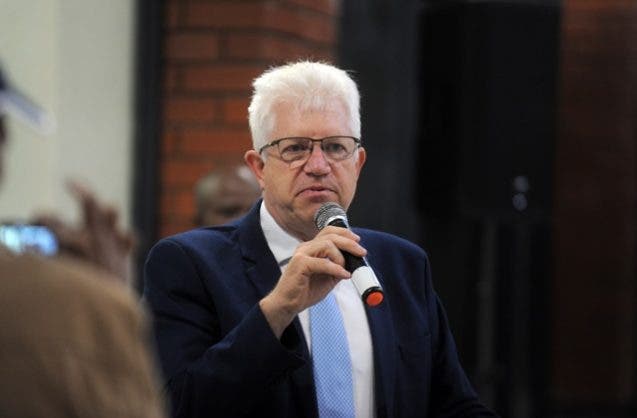Fifteen more Western Cape residents have died as a result of COVID-19, Premier Alan Winde announced this evening [June 6]. The deaths were recorded in the past 24 hours.
“The Western Cape has recorded an additional 15 COVID-19 deaths bringing the total number of deaths from the virus in the province to 699. We send our condolences to their families and friends,” he said.
The Cape currently has 11 071 active cases of COVID-19, with a total of 29 136 confirmed cases and 17366 recoveries.
The Western Cape has now recorded 17366 recoveries, representing 60% of all cases to date. The province currently has 11 071 active cases. In some of our hotspot areas, the recovery rates have been even higher than the provincial average. In Tygerberg, which has the highest number of cases in the province, 68% of all cases have recovered so far. In Khayelitsha, 69% of all cases so far have resulted in recoveries and in Witzenberg where our hotspot plan was first introduced, the recovery rate currently stands at almost 80%.
Total confirmed COVID-19 cases – 29136
Total recoveries – 17366
Total deaths – 699
Total active cases (currently infected patients) – 11071
Tests conducted – 193035
Hospital admissions – 1082 with 226 in ICU or high care
Sub Districts Cape Town Metro:
Western – 2686 cases; 1729 recoveries
Southern – 2994 cases; 1752 recoveries
Northern – 1778 cases, 1148 recoveries
Tygerberg – 4129 cases; 2843 recoveries
Eastern – 2747 cases; 1628 recoveries
Klipfontein – 3454 cases; 2020 recoveries
Mitchells Plain – 2784 cases; 1688 recoveries
Khayelitsha – 3668 cases; 2544 recoveries
Total – 24240 cases; 15352 recoveries
Sub-districts:
Garden Route: Bitou – 15 cases; 14 recoveries
Garden Route: Knysna – 68 cases; 44 recoveries
Garden Route: George – 102 cases; 48 recoveries
Garden Route: Hessequa – 14 cases; 10 recoveries
Garden Route: Kannaland – 1 case; 1 recovery
Garden Route: Mossel Bay – 33 cases; 27 recoveries
Garden Route: Oudsthoorn – 15 cases; 5 recoveries
Cape Winelands: Stellenbosch – 350 cases; 152 recoveries
Cape Winelands: Drakenstein – 1035 cases; 490 recoveries
Cape Winelands: Breede Valley – 429 cases; 155 recoveries
Cape Winelands: Langeberg – 63 cases; 14 recoveries
Cape Winelands: Witzenberg – 296 cases; 235 recoveries
Overberg: Overstrand – 93 cases; 52 recoveries
Overberg: Cape Agulhas – 15 cases; 5 recoveries
Overberg: Swellendam – 11 cases; 8 recoveries
Overberg: Theewaterskloof – 100 cases; 42 recoveries
West Coast: Bergrivier – 71 cases; 37 recoveries
West Coast: Cederberg – 6 cases; 2 recoveries
West Coast: Matzikama – 9 cases; 0 recoveries
West Coast: Saldanha Bay Municipality – 136 cases; 51 recoveries
West Coast: Swartland – 141 cases; 59 recoveries
Central Karoo: Beaufort West – 1 cases; 1 recoveries
Unallocated: 1892 (562 recovered)
The Western Cape Government is working hard to prepare additional beds in the hospital system to ensure that there will be enough space in hospitals at the peak of the virus, which is anticipated at the end of June or beginning of July. These additional beds will also require additional staff in order to care for our residents.
The Western Cape Department of Health is currently conducting a recruitment drive for healthcare professionals such as doctors and nurses, to take up temporary posts during the COVID-19 period. Qualified healthcare professionals who are interested in taking up temporary employment during the peak, can find more information on the work, and the application processes here: https://coronavirus.westerncape.gov.za/covid-19-recruitment…
“Not everyone will be deployed to the frontline. Depending on your age and risk profile, you may be deployed to low risk areas, to call centres or to support with telephonic consultations,” Winde said. “I encourage all of those who are interested in these temporary, paid posts, to apply and help us to save lives. I would also like to thank all of those healthcare workers, including nurses, doctors, specialists, technicians, porters, cleaners and all of the other support and clerical staff currently working in the province for the work that they are doing. You are all heroes.”
Most people will recover from COVID-19 and experience only mild symptoms. The province’s new risk adjusted testing strategy means that healthy people under 55 will not be able to be tested in the metro region.
The following groups of people who are experiencing symptoms will be tested: healthcare workers, those over the age of 55, those in hospitals or in old aged homes, those under the age of 55 with comorbidities including diabetes, hypertension, heart disease, cancer, TB, chronic lung disease and HIV with poor ARV adherence.
“This strategy is in place because of the national backlog in testing and will prioritise those groups of people who are at higher risk of becoming seriously ill or dying. This system will ensure that those who need testing most are prioritised over young, healthy individuals,” Winde added. “If you are experiencing symptoms such as a fever, a sore throat, or a cough, and are young, fit and healthy, you should act as if you have COVID-19. If you are able to self-isolate at home, you will need to move to a separate room or area of the house, where you have no contact with anyone else. If you live with other people, one healthy person can act as your caregiver. This person should leave food for you at the door of your room, and regularly clean surfaces.”
Use a dedicated set of items such as cups, plates, cutlery and towels for yourself. Dispose of any waste carefully by placing it in two bags and keeping it separately for five days before putting out for collection. Ensure you wash your clothing, towels and cloth masks at a high heat.
“You should not leave your home, and should rest, drink lots of fluids, eat healthily and use paracetamol for fever or pain.”
Picture: Twitter

